自考高级英语上册lesson8
高级英语(第三版)第一册第八课 Three cups of tea

School of Government • 2009 U.S. News & World Report: America's Top 20 Best Leaders 2009 • 2009 Italy: Premio Gambrinus “Giuseppe Mazzotti”
Greg Mortenson’s Awards (2)
construction.
Greg Mortenson
• Born on Dec. 27, 1957 • an American humanitarian,
professional speaker, writer, former mountaineer and a military veteran. • co-founder and Executive Director of the non-profit Central Asia Institute ( whose mission is to promote and support community-based education, esp. for girls, in remote regions of northern Pakistan and Afghanistan) • founder of the educational charity Pennies for Peace.
高级英语 第八课
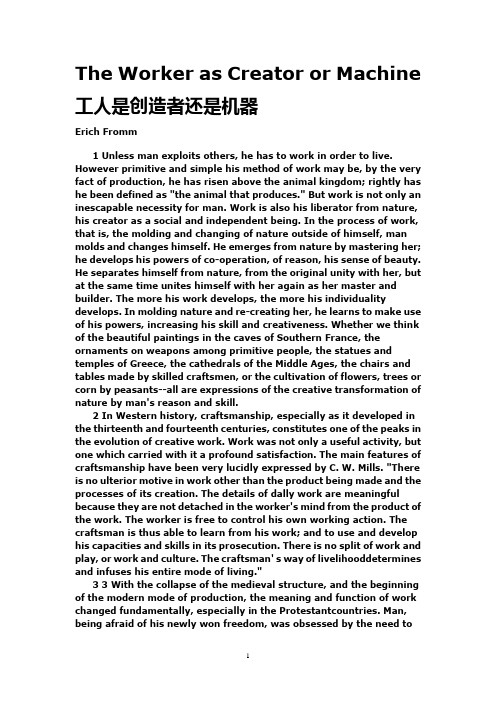
The Worker as Creator or Machine 工人是创造者还是机器Erich Fromm1 Unless man exploits others, he has to work in order to live. However primitive and simple his method of work may be, by the very fact of production, he has risen above the animal kingdom; rightly has he been defined as "the animal that produces." But work is not only an inescapable necessity for man. Work is also his liberator from nature, his creator as a social and independent being. In the process of work, that is, the molding and changing of nature outside of himself, man molds and changes himself. He emerges from nature by mastering her; he develops his powers of co-operation, of reason, his sense of beauty. He separates himself from nature, from the original unity with her, but at the same time unites himself with her again as her master and builder. The more his work develops, the more his individuality develops. In molding nature and re-creating her, he learns to make use of his powers, increasing his skill and creativeness. Whether we think of the beautiful paintings in the caves of Southern France, the ornaments on weapons among primitive people, the statues and temples of Greece, the cathedrals of the Middle Ages, the chairs and tables made by skilled craftsmen, or the cultivation of flowers, trees or corn by peasants--all are expressions of the creative transformation of nature by man's reason and skill.2 In Western history, craftsmanship, especially as it developed in the thirteenth and fourteenth centuries, constitutes one of the peaks in the evolution of creative work. Work was not only a useful activity, but one which carried with it a profound satisfaction. The main features of craftsmanship have been very lucidly expressed by C. W. Mills. "There is no ulterior motive in work other than the product being made and the processes of its creation. The details of dally work are meaningful because they are not detached in the worker's mind from the product of the work. The worker is free to control his own working action. The craftsman is thus able to learn from his work; and to use and develop his capacities and skills in its prosecution. There is no split of work and play, or work and culture. The craftsman' s way of livelihooddetermines and infuses his entire mode of living."3 3 With the collapse of the medieval structure, and the beginning of the modern mode of production, the meaning and function of work changed fundamentally, especially in the Protestantcountries. Man, being afraid of his newly won freedom, was obsessed by the need to subdue his doubts and fears by developing a feverish activity. Theout-come of this activity, success or failure, decided his salvation, indicating whether he was among the saved or the lost souls. Work, instead of being an activity satisfying in itself and pleasurable, became a duty and an obsession . The more it was possible to gain riches by work, the more it became a pure means to the aim of wealth and success. Work became, in Max Weber's terms, the chief factor in a system of "inner-worldly asceticism ," an answer to man's sense of aloneness and isolation.4 However, work in this sense existed only for the upper and middle classes, those who could amass some capital and employ the work of others. For the vast majority of those who had only their physical energy to sell, work became nothing but forced labor. The worker in the eighteenth or nineteenth century who had to work sixteen hours if he did not want to starve was not doing it because he served the Lord in this way, nor because his success would show that he was among the "chosen " ones,, but because he was forced to sell his energy to those who had the means of exploiting it. The first centuries of the modern era find the meaning of work divided into that of duty among the middle class, and that of forced labor among those without property.5 The religious attitude toward work as a duty, which was still so prevalent in the nineteenth century, has been changing considerably in the last decades. Modern man does not know what to do with himself, how to spend his lifetime meaningfully, and he is driven to work in order to avoid an unbearable boredom. But work has ceased to be a moral and religious obligation in the sense of the middle class attitude of the eighteenth and nineteenth centuries. Something new has emerged. Ever-increasing production, the drive to make bigger and better things, have become aims in themselves, new ideals. Work has become alienated from the working person.6 What happens to the industrial worker? He spends his best energy for seven or eight hours a day in producing "something." He needs his work in order to make a living, but his role is essentially a passive one. He fulfills a small isolated function in a complicated and highly organized process of production, and is never confronted with "his" product as a whole, at least not as a producer, but only as a consumer, provided he has the money to buy "his" product in a store. He is concerned neither with the whole product in its physical aspects nor with its wider economic and social aspects. He is put in a certain place, has to carry out a certain task, but does not participate in the organization or management of the work. He is not interested nor does he know why one produces this, instead of another commodity--what relation it has to the needs of society as a whole. The shoes, the cars, the electric bulbs, are produced by "the enterprise," using the machines. He is a part of the machine, rather than its master as anactive agent. The machine, instead of being in his service to do work for him which once had to be performed by sheer physical energy, has become his master. Instead of the machine being the substitute for human energy, man has become a substitute for the machine. His work can be defined as the performance of acts which cannot yet be performedby machines.7 Work is a means of getting money, not in itself a meaningful human activity. P. Drucker, observing workers in the automobile industry, expresses this idea very succinctly "For the great majority of automobile workers, the only meaning of the job is in the pay check, not in anything connected with the work or the product. Work appears as something unnatural, a disagreeable, meaningless and stultifying condition of getting the pay check, devoid of dignity as well as of importance. No wonder that this puts a premium on slovenly work, on slowdowns , and on other tricks to get the same pay check with less work. No wonder that this results in an unhappy and discontented worker--because a pay check is not enough to base one's self-respect on."8 This relationship of the worker to his work is an outcome of the whole social organization of which he is a part. Being "employed," he is not an active agent, has no responsibility except the proper performance of the isolated piece of work he is doing, and has little interest except the one of bringing home enough money to support himself and his family. Nothing more is expected of him, or wanted from him. He is part of the equipment hired by capital, and his role and function are determined by this quality of being a piece of equipment. In recent decades, increasing attention has been paid to the psychology of the worker, and to his attitude toward his work, to the "human problem of industry"; but this very formulation is indicative of the underlying attitude; there is a human being spending most of his lifetime at work, and what should be discussed is the "industrial problem of human beings," rather than "the human problem of industry."9 Most investigations in the field of industrial psychology are concerned with the question of how the productivity of the individual worker can be increased, and how he can be made to work with less friction; psychology has lent its services to "human engineering," an attempt to treat the worker and employee like a machine which runs better when it is well oiled. While Taylor was primarily concerned with a better organization of the technical use of the worker's physical powers, most industrial psychologists are mainly concerned with the manipulation of the worker's psyche The underlying idea can be formulated like this: if he works better when he is happy, then let us make him happy, secure, satisfied, or anything else, provided it raiseshis output and diminishes friction. In the name of " human relations," the worker is treated with all devices which suit values are recommended in the interest of better relations a completely alienated person; even happiness and human with the public. Thus, for instance, according to Time magazine, one of the best-known American psychiatrists said to a group of fifteen hundred Supermarket executives: "It's going to be an increased satisfaction to our customers if we are happy... It is going to pay off in cold dollars and cents to management, if we could put some of these general principles of values, human relationships, really into practice." One speaks of "human relations" and one means the most inhuman relations, those between alienated automatons ; one speaks of happiness and means the perfect routinization which has driven out the last doubt and all spontaneity10 The alienated and profoundly unsatisfactory character of work results in two reactions: one, the ideal of complete laziness; the other a deep-seated, though often unconscious hostility toward work and everything and everybody connected with it.11 It is not difficult to recognize the widespread longing for the state of complete laziness and passivity. Our advertising appeals to it even more than to sex, There are, of course, many useful and labor saving gadgets . But this usefulness often serves only as a rationalization for the appeal to complete passivity and receptivity. A package of breakfast cereal is being advertised as "new--easier to eat." An electric toaster is advertised with these words: "... the most distinctly different toaster in the world! Everything is done for you with this new toaster. You need not even bother to lower the bread.Power-action, through a unique electric motor, gently takes the bread right out of your fingers!" How many courses in languages, or other subjects, are announced with the slogan" effortless learn- ins, no more of the old drudgery." Everybody knows the picture of the elderly couple in the advertisement of a life-insurance company, who have retired at the age of sixty, and spend their life in the complete bliss of having nothing to do except just travel.12 Radio and television exhibit another element of this yearning for laziness: the idea of "push-button power"; by pushing a button, or turning a knob on my machine, I have the power to produce music, speeches, ball games, and on the television set, to command events of the world to appear before my eyes. The pleasure of driving cars certainly rests partly upon this same satisfaction of the wish forpush-button power. By the effortless pushing of a button, a powerful machine is set in motion; little skill and effort are needed to make the driver feel that he is the ruler of space.13 But there is far more serious and deep-seated reaction to the meaninglessness and boredom of work. It is a hostility toward workwhich is much less conscious than our craving for laziness and inactivity. Many a businessman feels himself the prisoner of his business and the commodities he sells; he has a feeling of fraudulency about his product and a secret contempt for it. He hates his customers, who force him to put up a show in order to sell. He hates his competitors because they are a threat; his employees as well as his superiors, because he is in a constant competitive fight with them. Most important of all, he hates himself, because he sees his life passing by, without making any sense beyond the momentary intoxication of success. Of course, this hate and contempt for others and for oneself, and for the very things one produces, is mainly unconscious, and only occasionally comes up to awareness in a fleeting thought, which is sufficiently disturbing to be set aside as quickly as possible.(from A Rhetorical Reader, Invention and Design,by Forrest D. Burt and E. Cleve Want) NOTES1. Fromm: Erich Fromm (1900- 1980), German-born psychoanalyst, has taught at universities in the United States and Mexico. Among his many books are: Psychoanalysis and Religion ; Marx' s Concept of Man ; Escape from Freedom ; The Sane Society; and The Crisis of Psychoanalysis.2. beautiful paintings in the caves of Southern France: referring to paintings and engravings on the rock face in the caves in France and Spain made by primitive man during the old stone age around 50,000 to 100,000 B. C.3. C. W. Mills: author of White Collar ( 1951 ), from which this quotation is taken.4. Protestant countries: referring to Germany, Switzerland, Scandinavia, the Netherlands, the British Isles and Early America5. Weber: Max Weber (1864- 1920), German sociologist, economist, and political writer. On the origin of capitalism in the West, his famous theory was as follows: Calvinism, Anabaptism, and their various combinations consider that man's economic success, achieved by an industrious life, proves that he is a chosen child of God. These religions thus provide an impulse to build up capital and to develop a capitalistic society, as occurred especially in the United States.Lesson Eight The Worker as Creator or MachineI . Drucker: professor Peter (Ferdinand) Drucker, American writer, teacher and management consultant, born on November 19, 1909, in Vienna, Austria; Professor of Man agement, New York University, since 1954; Clarke profes sor of Social Science; Clairemont Graduate School, Claire mont, California, since 1971; Management Consultant (own firm), since 1945; Fellow of AmericanAssociation for Ad vancement; Honorary Fellow of British Institute of Manage ment. Publications.The End of Economic Man (1939), The Future of Industrial Man (1942), Concept of the Corporation (1946), The New Society ( 1950), The Practice of Manage- ment (1954), Managing for Results (1964), Technology, Management and Society (1970), Manage~nent. Tasks, Re sponsibilities, Practices (1974), The Unseen Revolution IIow Pension Fund Socialism Came to America (1976), and text books and educational films.II.1. Man is the only animal that produces his own food and things he uses. He has to produce (or to work) in order to live.2. In the process of work man molds and changes himself. He emerges from nature by mastering her.3. Work was not only useful, but one which carried with it a profound satisfaction. Even the details of daily work were meaningful because they were not detached in the worker' s mind from the product of the work. The worker used and developed his capacities and skills in the process of production. There was no split of work andplay, or work and culture.4. Doubtful and fearful of his new freedom, man developed a feverish activity that became the index to the condition of his soul.saved and successful, or lost and unsuccessful. Work became a "duty and an obsession".5. Work was a duty for the upper classes and middle classes and forced labor for the lower classes, those without prop- erty. Those who had amassed capital and employed others to work looked upon it as a duty.6. Those who had to work long hours to keep from starving to death looked upon it as forced labor.7. He does not care about the relation between what he pro duces and society as a Whole. "Instead of the machine be ing the substitute for human energy, man has become a substitute for the machine.8. Work means getting money. The job itself is "disagree- able, meaningless and stultifying" and places a premium on "slovenly work", resulting in unhappy workers.9. The chief concern is to increase individual production. Whatever increases output and lessons frictions is valued. 10. The "ideal of complete laziness" and "deep-seated,though often unconscious hostility toward work".1. The ideas presented in paragraph 1 are only general ones. So in paragraph2 the author gives a more detailed explana tion of creative work by examples and a quotation of C. W. Mills' remark.2. The definition of an ideal kind of work in paragraph 2 is provided by the use of a direct quotation of C. W. Mills' re mark of craftsmanship--one of the peaks in the evolution of creative work, esp. in the thirteenth and fourteenth centuries.3. The first two paragraphs are very important. The role they play in the whole essay is that they provide a contrast of how creative work develops to itscontrary.4. Mills emphasizes both the process and the product. Druck er cites an instance of how Fromm' s statement is true a mong automobile workers. The direct quotations give au- thority to the position Fromm is taking, a paraphrase would not provide that directness and authenticity.5. The concerns and the objectives of industrial psychologists are to increase the productivity of workers. Their model is the machine. Fromm does not approve of this model or the activities of these industrial psychologists. He makes his attitude clear through his use of certain words and phrases -- "manipulation of the worker's psyche", "relations be- tween .. automations ".6. Work began to be alienated from people when it ceased to be "an activity satisfying in itself" and became instead "a duty and an obsession", this process came with the end of the medieval age and has continued ever since. Man is now subordinated to the machines he operates, and as a result he has lost hisself-respect and hates his work.7. The method employed by the writer to develop his theme and to convince his readers may be called the method of causal analysis or just simply causation. Everything that exists and every event that takes place has a cause, and most things produce effects or results. "The worker is no longer a creator but has become a machine" is the effect or result as well as the theme of the text, with Fromm's sur vey of the history of people's attitude toward work serves as the causes, so it is essential to the development of his causal analysis.8. Yes. Fromm does not employ the basic tenets of Marxism -- the existence of classes and class struggle -- to evalute and analyse the sociological problems in the United States. His basic approach is still that of a psychoanalyst, evaluat ing the psychological reaction of the worker to the working conditions and environment he finds himself in.IV.1. Because of the fact itself that man produces, he has devel oped far beyond all other animals.2. Work also frees man from nature and makes him into a so cial being independent of nature.3. All the above-mentioned work shows how man has trans formed nature through his reason and skill.4. Therefore pleasure and work went together so did the cul tural development of the worker go hand in hand with the work he was doing.5. Work became the chief element in a system that preached an austere and self-denying way of life. Work was the only thing that brought relief to those who felt alone and isolat ed leading this kind of ascetic life.6. In capitalist society the worker feels estranged from or hos tile to the work he is doing.7. Work helps the worker to earn some money; and earning money only is an activity without much significance or pur pose.8. Just earning some money is not enough to make a worker have a properrespect of himself.9. Most industrial psychologists are mainly trying to manage and control the mind of the worker.10. Better relations with the public will yield larger profits to management. The management will earn larger profits ifit has better relations with the public.11. The fact that many gadgets are indeed useful is often used by advertisers as a more "high-minded" cover for what is really a vulgar, base appeal to idleness and willingness to accept things.12. The businessman knows the quality or usefulness of his product is not what it should be. He despises the goods he produces, conscious of the deception involved.V. See the translation of the text.VI.1. kingdom: any one of the three divisions of the natural world2. being : a human being : one who lives or exists, or assumed to do so3. prosecution: the carrying on or engaging in something.This word is more commonly used in its legal sense of con ducting legal proceedings against somebody.4. chosen. (religious term) favored by God ; chosen by God to go to heaven after death5. alienated, estranged, detached6. physical: material7. agent: a person that brings forming a certain action about a certain result by per8. premium: an unusual or high value9. friction : conflict, strife10. psyche : mind11. pay off: yield full recompense or retrun, for either good or evil12. gadget: any small, especially mechanical contrivance or deviceⅦ. producer, maker, manufacturer, creator, author, originator, founder, inventor, builder, growerⅧ. 1. appropriateness, appropriation 2. precision, preciseness 3. subtlety, subtleness 4. preference, preferment 5. accep tance, acceptation 6. assembly, assemblage 7. absent mindedness 8. sincerity, sincereness 9. carriage 10. in heritance 11. English, England, Englishman, Englishwom an 12. ambiguity, ambiguousness 13. amassment 14. dis appointment 15. disallowance 16. physiology 17. provoca tion 18. judgement 19. understanding 20. extension IX. 1. falsehood 2. officialdom 3. bachelorhood, bachelorship 4. womanhood 5.lordship 6. deanship 7. priesthood 8. kingship, kingdom 9. brotherhood 10. trusteeship 11. guardianship 12. seamanship 13. knighthood 14. duke dom 15. marksmanship 16. princedom 17. township 18. censorship 19. serfdom 20. citizenshipX.1. backward 为消极词,表达一种具有消极意义的比较,主要起直接描述作用,如a backward mountain region。
高级英语第一册lesson8
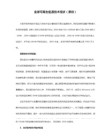
Sounds great in theory, but even the truest believers have a hard time when it comes to nailing down specifics about how it will actually work. Will we control the data via the telephone, the TV, the personal computer or a combination of all of the above? When will it be available? Will it be cheap enough for everyone? How will we negotiate such a mass of images, facts and figures and still find time to sleep? Will government regulate messages sent out on this vast data highway? And, frankly, what do we need all this stuff for anyway?
高级英语(1)第三版Lesson8ThreeCupsofTea翻译答案

高级英语(1)第三版Lesson8ThreeCupsofTea翻译答案Lesson 8 Three Cups of Tea (Excerpts)Translation1.当他被人从河里救出来时,几乎半死不活了。
2.在我上一次访问这个村子时,那里还没有学校。
现在一所小学已经屹立在山顶上。
3.他恢复了知觉,睁开眼睛,想努力搞清楚发生了什么事,为什么他躺在那里。
4.展览会上最吸引观众的是新奇的电子产品。
5.温室里的许多奇花异草引起大家争先拍照。
6.这位作家出生于一个大家庭,他的家谱可以追溯到十五代以前。
7.当地少数民族在杀牲口前,先要举行一番宗教仪式,请求上苍允许他们杀生。
8.村民们贫穷的事实并非说明他们就愚昧无知。
9.志愿者们的共同努力使得项目开展起来了。
10.登山者感到头晕,几乎站立不住,一是由于过度疲劳,也是因为太饥饿了。
参考译文1.When he was saved from the river, he was more dead than alive.2.On my previous visit, there was no school, but now one stands on the mountain.3.As he came to himself, he opened his eyes, trying to figure out waht had happened and why he was lying there.4.At the exhibition there were many novel electronic products that attracted the attention of visitors.5.People were keen on taking pictures of the many exotic flowers and plants in the greenhouse.6.This writer came from a large, prominent family whose genealogy streches back fifteen generations.7.Before killing an animal, the indigenous ethnic people usually hold rituals to request permission from their God.8.The fact that the villagers are poor doesn’t mean they are ignorant or stupid.9.The volunteers made concerted efforts and got the project off the ground.10.The climber felt so dizzy that he could hardly stand up, as much from over exhaustion as from starvation.。
高级英语上unit8

Para 4
Nowadays, the status of American women is changing. Please find out some examples about this.
• If you have a child, would you send him to private school or public school?
• It seems as though during the 1960s and 1970s we Americans made bold efforts to escape from old restrictions now intend to put an end to it, just as cautious people often do after excessive indulgence(放 纵).
• They believe in Christianity and are the members of the Christian churches, even though they attend religious services a bit less often, and they want their children to receive religious instruction.
主张实行自由企业制度,削减政府开支,平衡预算。在对外政策上,他强调 苏联对全球的威胁,主张要加强美国力量,“通过实力取得和平与安全”, 因此他主张大幅度增加国防预算,建立美国军事力量的优势。
It is as if our country spent the 1960s and 1970s jealously breaking out of old restraints and now wishes to put the brakes on, as cautious people often do after a binge.
高级英语上讲义Lesson8

Lesson Eight A Lesson in Living一、Words and Expressionsagegroup 年龄相近的一群人1.aristocrat n.aristocratic adj.aristocracy n.2.aura n.air, atmosphere 气氛There is an aura of mystery in this restaurant.3.cascade n.waterfalla cascade of blonde hairv.fall in like a cascade 瀑布般下泻Water has cascaded down the mountainside.Her blonde hair cascaded down her back.瀑布般披在后背上4.couch n.长沙发v.couch sth.in sth.表达 =expressa carefully couched reply 措辞严谨的答复heath 荒野5.include—inclusion—inclusive—inclusivelyinclusive adj.of sth.The price is 100 dollars, inclusive of tax.连税在内(=including)6.infuse v.灌输 infuse sth.into sb./ infuse sb.with sth.= put in or fill with infuse new idea into the students/infuse the students with new ideasinfuse new life into the enterprise 给企业注入新的活力infusion n.illiteracy 文盲7.tolerate—tolerant—intolerantlifeline 救生索8.memorize v.keep sth.in one's mindmemory n.in memory of sb./sth.my 感叹词odor 气味poetic 有诗意的9.ruffle v.I.弄皱A breeze ruffled the surface of the lake.湖面泛起涟漪Don't ruffle my shirt, for I just ironed it.ruffle sth.upII.upset one's temper 扰乱某人的情绪ruffle one's feathers = annoysmooth one's ruffled featherssaying 格言selflessness 无私10.to single out: pick out, sort out,11.sop v.(-pp-)浸,沾sop bread in soupsop sth.up Sop up the water with a paper towel.用纸巾把水吸干12.sophisticated plicated, complex 复杂的,世故的II.advanced 高、精、尖sophisticated modern weaponssophisticate n.老于世故的人sophistication n.世故,复杂性triangular 三角的,三角形的vanilla 香草精二.Text1.sop around 游走2.edible/inedible 可食用/不可食用3.measure: standard 尺度4.appeal to sb.for sth.向谁恳求、呼吁5.at a respectful distance 敬而远之6.incessantly: constantly, continuously 不间断地7.provide—provision8.agegroup look 同龄人的眼光“Come and walk along with me, Marguerite.” I couldn't have refused even if I wanted to. She pronounced my name so nicely. Or more correctly, she spoke each word with such clarity that I was certain a foreigner who didn't understand English could have understood her.“Now no one is going to make you talk - possibly no one can. But bear in mind, language is man's way of communicating with his fellow man and it is language alone which separates him from the lower animals.” That was a totally new idea to me, and I would need time to think about it.communicate with sb. 与谁交往bear in mind“Your grandmo ther says you read a lot. Every chance you get. That's good, but not good enough. Words mean more than what is set down on paper. It takes the human voice to infuse them with the shades of deeper meaning.”the shade of meaning 意思上的细微差别I memorized the part about the human voice infusing words. It seemed so valid and poetic.poetic 富有诗意的She said she was going to give me some books and that I not only must read them, I must read them aloud. She suggested that I try to make a sentence sound in as many different ways as possible.“I'll accept no excuse if you return a book to me that has been badly handled.” My imagination boggled at the punishment I would deserve in fact I did abuse a book of Mrs. Flowers'.Death would be too kind and brief.本句翻译:我应该受到比死亡更严厉的惩罚。
[英语学习]高级英语Lesson 8 The Worker as Creator or Machine
![[英语学习]高级英语Lesson 8 The Worker as Creator or Machine](https://img.taocdn.com/s3/m/a8cc7a3ba76e58fafab0035c.png)
Predicting the theme
• What becomes the meaning of work in an alienated society? • Is he creator or machine? • The worker is no longer a creator but has become a machine.
What are the values of work?
• (para.1) By working, man can:
• differ himself from animals (rise above the animal kingdom)
• free himself from nature (___________________) liberator from nature • socialize ________________________________________ himself and separate himself from nature (creator as a social and independent being)
exploit
• to develop and use minerals, forests, oil, etc for business or industry
• Why do some countries want to exploit Antarctica’s resources? • Does television show exploit young girls? • Is the risk of exploitation too high a price for children to pay for fame?
高级英语(第三版)第一册第八课 Three cups of tea
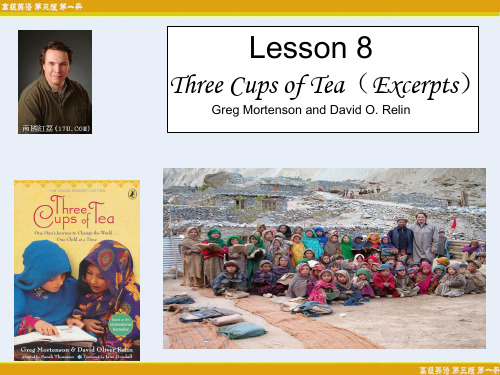
undertakings • 2010 Freedom Award - Freedom Festival for extraordinary devotion to the cause of liberty at
home and abroad • 2010 American Peace Award - representing the spirit of world peace through thoughts and
Books
•co-author of Three Cups of Tea: One Man’s Mission to Promote Peace…One School at a Time • author of Stones into Schools: Promoting Peace with Books, Not Bombs, in Afghanistan and Pakistan.
CA) • 2010 Distinguished Service To Education Award: National Elementary School Principals
Association • 2010 Creativity Foundation & Smithsonian Institution: Benjamin Franklin Laureate Award
自考高英上册Lesson 8
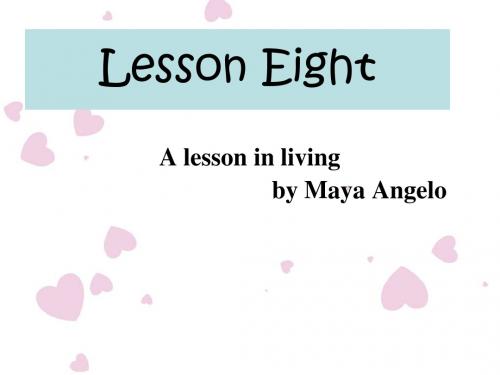
• 5. It would be safe to say that she made me proud to be Negro, just by being herself.可以肯定 地说,是她本人使我为自己是个黑人而感到骄傲。 p109 • It would be safe to say that …… 可以这么说……。 如; It would be safe to say that you would get nowhere if you are so lazy .可以这么说,如果你这 样懒惰,你将一事无成。 • by being herself :By being a black woman with such noble personality.
• 9.My imagination boggled at the punishment I would deserve ……我想像不出如果我真的没有认真 读弗劳尔斯夫人的某一本书,将会受到怎样的惩罚。 让我去死恐怕是太仁慈太干脆了。p110 • a. boggle : to overwhelm or bewilder , as with magnitude or complexity 吃惊,受惊,心惊肉跳 • b. deserve : be worthy of …… 值得 • 10. …but my mind never recorded it • …but my mind never formed a picture of it. • …but I did not have such impression.
• 12. Although she warned that she hadn‘t tried her hand at baking sweets for some time,尽管她事先说过她已经好 久没有做点心了, p111 • Try one’s hand at something 初试身手 • --I’d like to try my hand at computing(计算机运算技术). • 13. She said that must always be intolerant of ignorance but understanding of illiteracy.她告诉我不能 宽容无知,但可以理解文盲。 p111 • Sb. Be intolerant of …:不能容忍的 • --The leader is intolerant of different opinions. • Intolerable: too bad to be endured不能忍受的 • --The pain of headache was intolerable. • --intolerable heat, noise
英语自考本科高级英语笔记-上册-Lesson Eight

Lesson Eight A Lesson in Living Words and ExpressionsText Explanation1For nearly a year, I sopped around the house, the Store, the school and the church, like an old biscuit, dirty and inedible.For nearly a year, I spent most of my time on the house, the Store, the school and the church, like an old biscuit, dirty and not suitable for food.2Mrs. Bertha Flowers was the aristocrat of Black Stamps.Mrs. Bertha Flowers 是Stamps 黑人中的贵妇人。
3She had the grace of control to appear warm in the coldest weatherShe had a fine control of her movement to appear warm in the coldest weather.4…and on the Arkansas summer days it seemed she had a private breeze which swirl around, cooling her.…and on the Arkansas summer days she seemed to have a breeze of her own which swirled around, cooling her.5Her skin was a rich black that would have peeled like a plum if snaggedHer skin was a vivid deep black that would have peeled like a plum if it had been snagged.When "rich" is used to modify colour, means "strong and attactive"."if snagged" means if it was torn open by something sharp.6…to ruffle her dress弄皱她的衣服,实际上指“轻浮或轻率地对待她”,即:to trifle with her.7She didn't encourage familiarity.She didn't give people the courage to become intimate with her.8It would be safe to say that she made me proud of be Negro, just by being herself.It would be safe to say that she made me proud of be Negro, just by being a black woman with such a noble personality.9I've been meaning to talk to her.I've been intending to talk to her.10They gave each other agegroup looks.They gave each other meaningful llis, looks that were exchanged among and understood by people of the same age group.11…but that it's all written.…but it's all written work, referring to her school work.12I hung back in the separate unasked and unanswereable questions.hang back :hesitate 指胆小,怕羞而畏缩。
大学英语自学教程上册unit8
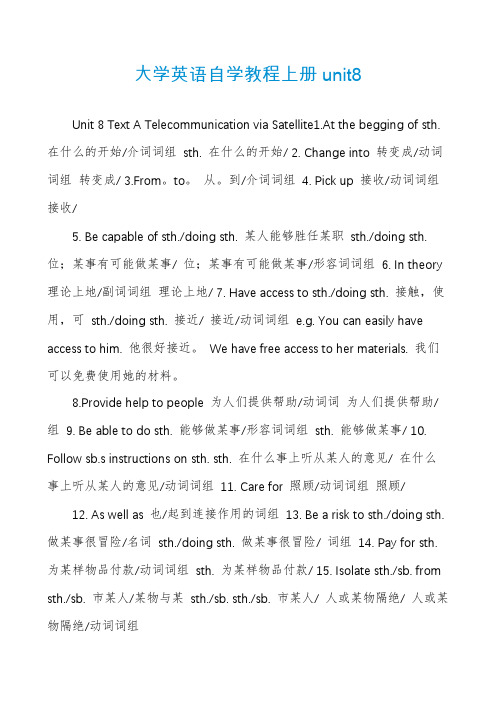
大学英语自学教程上册unit8Unit 8 Text A Telecommunication via Satellite1.At the begging of sth. 在什么的开始/介词词组sth. 在什么的开始/ 2. Change into 转变成/动词词组转变成/ 3.From。
to。
从。
到/介词词组 4. Pick up 接收/动词词组接收/5. Be capable of sth./doing sth. 某人能够胜任某职sth./doing sth. 位;某事有可能做某事/ 位;某事有可能做某事/形容词词组6. In theory 理论上地/副词词组理论上地/7. Have access to sth./doing sth. 接触,使用,可sth./doing sth. 接近/ 接近/动词词组 e.g. You can easily have access to him. 他很好接近。
We have free access to her materials. 我们可以免费使用她的材料。
8.Provide help to people 为人们提供帮助/动词词为人们提供帮助/ 组9. Be able to do sth. 能够做某事/形容词词组sth. 能够做某事/ 10. Follow sb.s instructions on sth. sth. 在什么事上听从某人的意见/ 在什么事上听从某人的意见/动词词组11. Care for 照顾/动词词组照顾/12. As well as 也/起到连接作用的词组13. Be a risk to sth./doing sth. 做某事很冒险/名词sth./doing sth. 做某事很冒险/ 词组14. Pay for sth. 为某样物品付款/动词词组sth. 为某样物品付款/ 15. Isolate sth./sb. from sth./sb. 市某人/某物与某sth./sb. sth./sb. 市某人/ 人或某物隔绝/ 人或某物隔绝/动词词组16. Do one’s banking 存钱或取钱(银行业务)/ 存钱或取钱(银行业务)/ 动词词组17. Prevent sth. from sth./doing sth. 阻止某事发生sth.sth./doing sth. /动词词组18. Lead sb. to success 引导某人成功;lead to sth./doing sth. 导致/动词词组sth./doing sth. 导致/语言点1. 时态题:By the middle of the century, both 时态题:By radio and television had become established means of transmitting sounds and/or pictures. By the time of +现在时间状语,用一般现在时;by the time +现在时间状语,用一般现在时;by of +将来时间状语,用将来完成时;by the time +将来时间状语,用将来完成时;by of +过去时间状语,用过去完成时。
自考高级英语Lesson Eight A lesson in Living
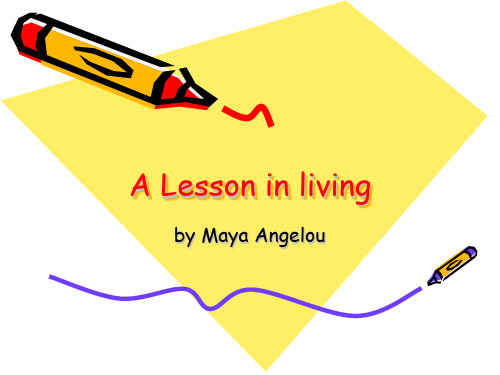
• 随后的几十年她成为一位成功的歌手、 演员、剧作家和导演,广泛涉足于戏剧、 电影、音乐等领域,同时还是一位活跃 的人权作家,一位非凡的女性。安吉罗 是当代美国黑人女诗人中的杰出代表, 她的诗歌创作从20世纪70年代延续到现 在,迄今为止她已经出版了十几部诗集, 并获得了多项大奖。
TEXT
• The lesson Mrs. Flowers teaches Marguerite is beneficial and far-reaching to Marguerite. Mrs. Flowers singles her out for attention, makes cookies for her and then reads novels to her. From Mrs. Flowers, she also learns the mystery of language, the value of life and good manners in life. Thus, skillfully and gently Mrs. Flowers guided her out of a dead alley into a world of knowledge and enlightenment.
translate
• The idea of camping has never appealed to me. • 对露营这种相法我从来就不感兴趣。 • Her sense of humor appealed to him enormously. • 她的幽默感把他强烈地吸引住了。
大学英语自学教程上UNIT8
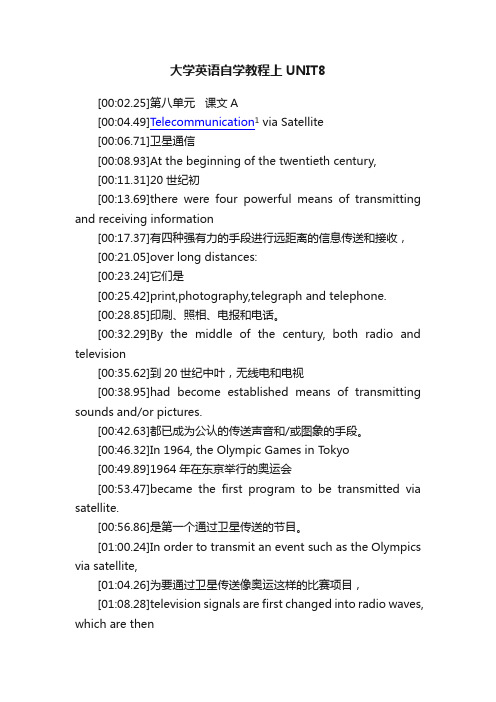
大学英语自学教程上UNIT8[00:02.25]第八单元课文A[00:04.49]Telecommunication1 via Satellite[00:06.71]卫星通信[00:08.93]At the beginning of the twentieth century,[00:11.31]20世纪初[00:13.69]there were four powerful means of transmitting and receiving information[00:17.37]有四种强有力的手段进行远距离的信息传送和接收,[00:21.05]over long distances:[00:23.24]它们是[00:25.42]print,photography,telegraph and telephone.[00:28.85]印刷、照相、电报和电话。
[00:32.29]By the middle of the century, both radio and television[00:35.62]到20世纪中叶,无线电和电视[00:38.95]had become established means of transmitting sounds and/or pictures.[00:42.63]都已成为公认的传送声音和/或图象的手段。
[00:46.32]In 1964, the Olympic Games in Tokyo[00:49.89]1964年在东京举行的奥运会[00:53.47]became the first program to be transmitted via satellite.[00:56.86]是第一个通过卫星传送的节目。
[01:00.24]In order to transmit an event such as the Olympics via satellite,[01:04.26]为要通过卫星传送像奥运这样的比赛项目,[01:08.28]television signals are first changed into radio waves, which are then[01:12.07]应先把电视信号变成无线电波,[01:15.86]sent from a station on earth to an orbiting satellite.[01:18.94]然后从地球上的某个发射站把无线电波送上轨道卫星。
高级英语Lesson 8 A more perfect union

3. I’m deeply ingrained, through my experience in the United States, with the idea that America is not a total adding of everything together, but is the product of fusion, of sharing the same creed. 4. In spite of all the announcements that America was not ready for a black president, that I would fail in the campaign, we gained momentum in the first year of the campaign, which showed that the American people demanded unity and change. 5. People were encouraged to judge me from the perspective of a black candidate, raising the question of whether the United States would fare better with a black president. However, we won great victories in some of the most conservative states, states with stronger racial bias
第18段
事实上这不是我所认识的那个人的全部。我二十年前认 识的这个人是一个把我引入基督信仰的人,是一个教导 我爱其他人作为义务的人,教导我要照顾病人、要使穷 人脱贫的人。他曾参加海军陆战队为国家服务;他在这 个国家某些最优秀的大学和神学院就读或任教,他领导 一个教会,三十年来为社区服务,在人世间从事着上帝 的工作——为无家可归者提供住宿,为穷人提供帮助, 提供白天托儿服务,奖学金和监狱牧师服务,并照顾艾 滋病患者。
自考高级英语上册8练习
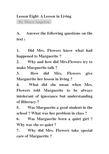
Lesson Eight A Lesson in LivingBy Maya AngelouA. Answer the following questions on the text :1. Did Mrs. Flowers know what had happened to Marguerite ?2. Why and how did Mrs.Flowers try to make Marguerite talk ?3. How did Mrs. Flowers give Marguerite her lesson in living ?4. What did she mean when Mrs. Flowers told Marguerite to be always intolerant of ignorance but understanding of illiteracy ?5. Was Marguerite a good student in the school ? What was her problem in class ?6. Was Marguerite born a quiet girl ? Why was she so quiet ?7. Why did Mrs. Flowers take special care of Marguerite ?8. How was Mrs. Flowers a source of enlightenment to Marguerite ?9. What was the image of Mrs. Flowers in the child’s mind ?10. Were the blacks and whites equal in the town of Stamps ?Key A1. Yes, she did .2. Because Mrs. Flowers heard the teachers had trouble getting Marguerite to talk in class . She invited her to her home , made cookies for her and read her favourite book to her and then asked questions to her .3. Mrs. Flowers gave Marguerite her lesson in living by inviting her to her home and having a little chat with her .4. She could not stand those who would n’t study , but she could understand those who didn’t have a chance to study . She also encouraged Marguerite to learn inevery possible way .5. Yes, she was . But she seldom talked in class .6. No , she wasn’t . Because something unfortunate happened to her when she was eight .7. Because Mrs. Flowers knew what had happened to her and wanted to change her life .8. From what Mrs. Flowers had done to her , she knew she was liked , which made a great difference .9. Mrs. Flowers was the measure of what a human being can be in the child’s mind .10. No, they were not .B. Translate the following into Chinese :1. Her skin was a rich black that would have peeled like a plum if snagged .2. Another Negro woman of her healthand age would have been expected to carry the paper sacks home in one hand.3. Mrs. Flowers walked in front swinging her arms and picking her way over the stones .4. Words mean more than what is set down on paper.5. It takes the human voice to infuse words with the shades of deeper meaning .6. She suggested that I try to make a sentence sound in as many different ways as possible .7. It occurred to me that she expected a response .8. That in those homely sayings was couched the collective wisdom of generations .1. 她的皮肤黝黑,如果被尖锐的东西弄破, 就会像李子皮一样剥落下来.2. 如果是另一位与她健康状况/年龄相仿的黑人妇女, 就会自己把装好东西的纸袋拿回家去.3. 弗劳尔斯夫人走在前边, 摆动双臂, 小心地躲开石头.4. 词的含义不止写在纸上的那些.5. 人的声音可以赋予它们更加深刻的含义.6. 她建议我尽量用不同的方法大声朗读同一个句子.7. 在我看来她期待我的回答.8. 她说这些质朴无华的话语表达了一代又一代人的集体智慧.C. Fill in the blank in each sentence with the best word or expression from the box below , changing its form when necessary :Infuse赋予the measure of….标准intolerant let alone更不用说 memorize熟记cascade小瀑布 ruffle弄皱couch沙发swirl打旋 single out挑选 inclusive包含在内的 sop1. The wind ruffled the surface of the lake .2. All the children in the class did wrong , but David was singled out for punishment .3. He can’t even read the alphabet , let alone speak the language .4. His speech infused his countrymen with patriotism爱国心.5. You are expected to memorize all the transitive verbs in the text .6. She is the measure of榜样what a college student should accomplish .7. He can’t be a good manager . He is intolerant of any criticisms about his management .8. When it rained , water would cascade down the hill .D. Choose the right word or expression in the brackets to complete each of thefollowing sentences :1. Students of English are required to ( remember记得, memorize熟记) the listed 2,000 words .2. You should not be ( intolerable不能忍受的,intolerant不能容忍的) of different religious beliefs .3. He tried to ( infuse, fill ) the awkward situation with humor .4. We have a sense of working towardsa ( common共同的, ordinary ) goal .5. The virus can only be transmitted through ( familiar , intimate ) contact .6. It suddenly ( happened , occurred ) to him that he had worked for twelve hours without eating anything . ]7. The students waited in ( respectable , respectful) silence for the Nobel Prize winner to make his speech .辨别:respectable, respectful 和respective这三个形容词都是由动词respect 分别加后缀派生而来的,在含义和用法上是有区别的。
大学英语自学教程上册unit8

大学英语自学教程上册unit85.becapableofsth./doingsth.某人能够胜任某职sth./doingsth.位;某事有可能做某事/位;某事有可能做某事/形容词词组6.intheory理论上地/副词词组理论上地/7.haveaccesstosth./doingsth.接触,使用,可sth./doingsth.接近/接近/动词词组e.g.youcaneasilyhaveaccesstohim.他很好接近。
wehavefreeaccesstohermaterials.我们可以免费使用她的材料。
8.为人提供帮助/动词单词为人提供帮助/第9组beabletodoth。
能做某事/形容词短语…能做某事。
罪孽深重。
听某人的话。
关于什么事[听某人说]。
关于什么事/动词短语关心/动词短语关心/12.aswellas也/起到连接作用的词组13.bearisktosth./doingsth.做某事很冒险/名词sth./doingsth.做某事很冒险/词组14.payforsth.为某样物品付款/动词词组sth.为某样物品付款/15.isolatesth./sb.fromsth./sb.市某人/某物与某sth./sb.sth./sb.市某人/人或某物隔绝/人或某物隔绝/动词词组存或取钱(银行)存或取钱(银行)动词短语。
来源于某物做某事。
阻止某事发生某事/做某事/动词短语引导某人。
引导某人走向成功;Leadtosh./做某事。
原因/动词短语某事/做某事原因/6.contact为不可数名词,可以用much来修饰contact为不可数名词,可以用much 来修饰,表示许多联系。
7.翻译:itisimportanttorealizethatthesame翻译:帮助Susmayalsoharmus的技术。
重要的是要认识到,技术可以帮助我们,也可以伤害我们。
textbwhatpeopledon’tknowaboutair1.beimportanttosb.对某人来说很重要/形容对某人来说很重要/词词组2.inordertodosth.为了做某事/表示目的的动sth.为了做某事/词不定式短语3.asweknowit正如我们所知道的那样/状语正如我们所知道的那样/4.beforcedtodosth.被迫做某事,不得不做sth.某事/某事/动词词组5.避开,避开;避免;避免;避免;保护某人。
自考高级英语考前串讲第8章

Respectful, respectable, respective
Respectful (to, toward sb., of sth.): feeling or showing respect
Shade of sth.: slight difference in sth 细微的差别
--a word with many shades of meaning 有许多相近意思的一个词 --people with all shades of opinion
Memorize (learn and remember on purpose), remember
respective rooms.
By being herself:
By being a black woman with such noble personality.
Provision (pl) 食物和饮料,饮料的 供应
--She had a plentiful store of provisions.
分居 (3) Separate: 从中隔开(两国,两地) --The Atlantic separates Europe from America. --A river separated the two halves of the city.
Separate … from …: distinguish … from …
--It was just an ordinary weekend for us. Common: 1. ordinary 2.If something is common, it is found in large
- 1、下载文档前请自行甄别文档内容的完整性,平台不提供额外的编辑、内容补充、找答案等附加服务。
- 2、"仅部分预览"的文档,不可在线预览部分如存在完整性等问题,可反馈申请退款(可完整预览的文档不适用该条件!)。
- 3、如文档侵犯您的权益,请联系客服反馈,我们会尽快为您处理(人工客服工作时间:9:00-18:30)。
Common, ordinary
• Ordinary: Ordinary people or things are normal and not special or different in any way.(无特别之处) • --It was just an ordinary weekend for us. • Common: 1. ordinary • 2.If something is common, it is found in large numbers or it happens often.普通的,常见的,普遍的 • --Earthquakes are not common in this part of the world. • --Gambling was common in China before liberation.
Respectful, reห้องสมุดไป่ตู้pectable, respective
• Respectful (to, toward sb., of sth.): feeling or showing respect • 恭敬的,表示尊敬或尊重的 • --stand at a respectful distance • --respectful of other people’s opinions • --The boy was well-mannered and respectful toward the aged.
…but my mind never recorded it
• …but my mind never formed a picture of it. • …but I did not have such impression.
Or rather: 更确切的说
• --I arrived home late last night, or rather early this morning.
The grace of control
• … a fine control of her movement
Peel: vi 脱皮,
• --She spent ten minutes memorizing the lists of prices. It’s amazing. • --Please memorize the alphabet. • --I remembered telling the case. • --He remembered every word he had learned. • --Remember to bring me the book. • --Remember what I said.
Hang back:
• 犹豫, 踊跃不前, 畏缩
• --I saw him step forward and then hang back, nervously rubbing his hands.
• --Even the closest adviser believes he should hang back no longer.
unit 8
A Lesson in living
by Maya Angelou
Sop: 将…放在液体中蘸或浸泡
• --sop bread in soup • --I was sopped through in the rain this morning.
• I spent most of my time …
• Would divide the lesson into five parts. • Divide the money equally.
Infuse:
• 将(某特性)灌输给或注入…, 使…获得(某特性) • --He argued that a union would infuse unnecessary conflict into the company’s employee relations. • You should infuse new knowledge into yourself all the time. --infuse the workers with new life, energy
By being herself:
• By being a black woman with such noble personality.
Provision (pl) 食物和饮料,饮料的 供应
• --She had a plentiful store of provisions.
• 提供,供应 • --The government is responsible for the provision of medical services.
Respectful, respectable, respective
• Respectable: • 体面的,值得尊敬的 • --The professor is also a respectable old man. • --a respectable middle-class background • Respective: • 分别的,各自的 • --After class, we went off to our respective rooms.
• --under the provisions of the agreement
They gave each other agegroup looks
• They gave each other meaningful looks that were exchanged among and understood by people of the same age group.
• • • •
Measure: (估计,评判事务的)标准, 尺度
• --Examinations are only one measure of students’ abilities. • --She is the measure of what a college student should accomplish.
Separate … from …: distinguish … from …
• --I can not separate Tom from Jack, as they are twins. • --That unusual talent separates her from other students in her class
Shade of sth.: slight difference in sth 细微的差别
• --a word with many shades of meaning • 有许多相近意思的一个词 • --people with all shades of opinion
Memorize (learn and remember on purpose), remember
Let alone: 更不必说
• --She never gets up early on weekdays, let alone on weekends. • --He can’t even read the alphabet, let alone speak the language.
She didn’t encourage familiarity(亲密而不 拘礼仪).
Familiar, intimate
• • • • familiar 熟悉的,通晓的 --Every pupil is familiar with such facts. --Such facts are familiar to every pupil. Familiar: too informal, more friendly and informal than is acceptable 过分亲密的,冒失的 --The children are too familiar with their teacher. 这帮小孩对老师过于随便. Intimate: close --He is my intimate friend.
Appeal to sb.: 引起(某人)兴趣,吸 引(某人)
• --Her sense of humor appealed to him.
• Appeal: attraction吸引力 • --This kind of music hasn’t much appeal for me. • Appeal 恳请,请求(n.,v.) • --She made an appeal to her father for permission of her marriage.
Personally: 亲身,亲自
• • • • --The plan was personally inspected by the minister. Personally: as a person 作为个人,就个人而论 --I don’t know him personally, but I have read his book. • Personally: as far as I am concerned • 就我而言,就自己而言 • --Personally (speaking), I don’t like him at all.
• --These oranges peel easily.
• • • • Peel: vt. 除去(水果等)的皮 --peel a banana, an apple If snagged: if it had been snagged If it had been town open by something
Separate from 将…分开,离开,隔离
• --The two groups of fans must be separated in the stadium. • (2) Separate 分开,分离;分手;分居; • --The branch has separated from the trunk of the tree.分 开,分离; • --We talked until midnight and then separated分手. • --After ten years marriage, they decided to separate.分 居 • (3) Separate: 从中隔开(两国,两地) • --The Atlantic separates Europe from America. • --A river separated the two halves of the city.
